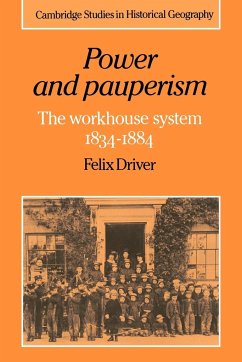Power and Pauperism aims to provide a new perspective on the place of the workhouse in the history and geography of nineteenth-century society and social policy. The workhouse system is set in the wider context in an age associated, paradoxically, with both laissez-faire and increasing state regulation. The study pays particular attention to conflicts over Poor Law policy and workhouse design. Dr Driver demonstrates that despite appearances the workhouse system was far from monolithic, and that official policy was beset with conflict: his study combines a national perspective on the system with a sensitivity to regional variation in policy and practice. The analysis of patterns of relief regulation and institutional provision presented here provides, for the first time, a truly national picture of the workhouse system in operation. Power and Pauperism emphasises the need to link the study of social policy with wider patterns of power and the value of a geographical perspective in the study of social policy. The book as a whole offers a challenging new interpretation of the historical geography of social policy in nineteenth-century Britain.








